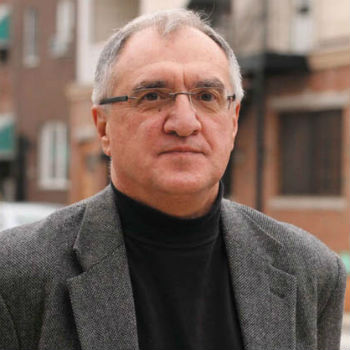
Mob Scene
We’ve been here before
Some things never change.
The New Jersey Attorney General’s Office has detailed yet another racketeering-gambling case against the Jersey branch of the Lucchese crime family. Thirty-nine mob members and associates have been charged in what authorities allege was a $3 million gambling ring built around poker rooms, internet sports betting, bookmaking and loan sharking. We’ve been here before.
“Organized crime in 2025 may look different than it did 50 years ago, especially thanks to the online component,” said Attorney General Matthew J. Platkin at a news conference in April where he announced the arrests. But the bottom line remains the same, “criminals motivated by greed and power who think they are above the law,” he said.
Those charged in the case include George Zappola, described as a member of the “ruling panel” of the Lucchese organization, Joseph “Big Joe” Perna said to be a capo in charge of the New Jersey crew, and Perna’s cousin, John, listed as a soldier and major gambling operative for the organization in the Garden State.
The Pernas, according to underworld and law enforcement sources, are third-generation mobsters. John was one of the defendants in the last big case, an investigation dubbed Operation Heat that unfolded in 2007. His brother, “Little Joe” and his father were also charged along with two high-ranking New York leaders of the organization. All ended up doing jail time.
“This was not a backyard betting pool,” said Theresa L. Hilton, director of the Division of Criminal Justice, at the same April news conference. “This was a highly structured, highly profitable criminal enterprise run by people who believed they were above the law.”
A former North Jersey mob figure offered an underworld perspective on the latest case and the players involved.
“Gambling for the Pernas is like politics for the Kennedys,” he said. “It’s in their blood.”
The case is months away from trial and as often happens, many of the lesser players are expected to plead out before a jury begins hearing testimony. Bail was originally denied for Zappola and the Pernas, but their lawyers were appealing that issue as this was being written.
“It’s a gambling case, nothing more,” said one source close to the Perna camp who argued that denying bail was part of the hype surrounding an investigation that law enforcement is trying to make more important than it really is. SWAT teams descending on Zappola’s condo on the day of the arrests was another example, he said.
Zappola, nicknamed “Georgie Neck,” appears to be the primary target. The 65-year-old mobster came up in the organization under the notorious Anthony Casso and in the 1990s was convicted in a murder-racketeering case that carried a 22-year prison sentence.
While in a federal prison, he was accused of bribing a prison guard to smuggle a sample of his sperm to a fertility clinic in order to impregnate his girlfriend. The girlfriend later changed her mind about the planned pregnancy, but the case was dropped when she refused to testify against him. Released from jail about 10 years ago, he has steadily moved up the ranks of the organization and is now part of the ruling committee of the Lucchese family, according to authorities.
An arrest complaint details various meetings in which Zappola is alleged to have received cash from members of the gambling ring. In the mob, money always flows up. But to date, most of the information about alleged criminal activity focuses on the lesser players.
Mob & Politics
One added twist which has drawn additional attention is the fact that one of the defendants is Prospect Park Borough Council Member Anand Shah. Shah is accused of managing poker games and running an online sports betting book.
The mob and politics – quintessential New Jersey.
The mayor of Prospect Park was quick to point out that the allegations against Shah were unrelated to his duties as a councilman, insisting that “transparency” and “ethics” were the hallmarks of local government.
Somewhere Tony Soprano is smiling. In fact, many believe the history and antics of the New Jersey branch of the Lucchese crime family were the inspiration for that long-running HBO series. If so, the latest case adds several more story arcs.
There is, for example, a separate charge focusing on two of the gambling operatives who are accused of routinely shoplifting from a local Home Depot, taking shopping carts full of items used to refurbish houses they had purchased and planned to resell.
And there are details about meetings in North Jersey coffee shops and restaurants, with envelopes (stuffed with cash?) supposedly changing hands. Conversations about mob business and underworld gossip were also overheard by investigators who were close enough to listen.
On at least two occasions there were references to the Philadelphia crime family which has long had an interesting relationship with the Lucchese crew from North Jersey.
21st-Century Crime, 21st-Century Tactics
More details are expected to surface as the case moves toward trial.
But what is already clear is that this was a 21st-century investigation. While the gambling ring might have been taking advantage of modern, high-tech online platforms to operate its sportsbook, law enforcement smoothly tapped into that same technology to build its case.
A 29-page criminal complaint detailing the charges against each defendant includes repeated reference to electronic surveillance, text messages, banking records and footage from security surveillance cameras set up by the gambling operatives but reviewed by authorities who had obtained a “Communications Data Warrant” to get access.
Authorities said a review of Shah’s iCloud account, for example, included a message in which he referred to his “partners Joey and John Perna.” Tracking cash movements on Cash App and Zelle, authorities said Shah moved $365,725 during one four-year period to and from members of the alleged betting ring.
In all, authorities say they have tracked thousands of text messages showing members of the betting ring “explicitly discussing gambling activities on the sportsbook and the collection of gambling debts.”
Several of the operatives used legitimate businesses as a front or cover for their gambling activities, according to the complaint, and often transferred cash through legitimate accounts in what authorities allege was money laundering.
Pinball, Poker, and Shell Companies
Mario Capalbo, the owner of Garden Pinball in Paterson, was described as a “poker manager” at the Café San Gennaro in Woodland Park and also the supplier of illegal gambling machines for the poker rooms.
“Players may have to wait for a seat to become available at the poker tables,” according to the criminal complaint. “Thus, the gambling machines are available for players who are waiting or choose to use the machines instead of a live game.”
Authorities allege that Capalbo’s business generated $515,362 in cash deposits during the four-year period of the investigation and that he used a “shell company” through which he moved $1,259,968.
“I believe the business accounts were used solely to make the cash payments look legitimate,” wrote New Jersey State Police Detective Sergeant Michael Gallant, who filed the criminal complaint.
Gallant also pointed to the high-tech use of websites as a modern twist on a very old game.
“The websites allow traditional organized crime members and associates to use the internet and current technology to engage in the same criminal acts that traditional organized crime has engaged in since the 19th century,” Gallant wrote in the complaint.
But while high-tech might have been used to streamline the business, some things remained very much the same.
“If a bettor…failed to pay his gambling losses,” Gallant wrote, “agents and subagents reported the delinquent debt to high-ranking members of the enterprise who used threats of violence to collect.”
Some things never change.

